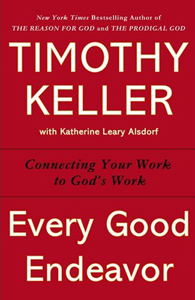Every Good Endeavor: Connecting Your Work to God’s Work. By Timothy Keller. Dutton: New York. 2012. 287 pp. $26.95.
In an era where there remains a sharp distinction between “secular profession” and “Christian vocation,” the sacred ministry and the unconsecrated jobs, full time work and banal occupation, Timothy Keller’s Every Good Endeavor is a welcome addition to the other writings on the theology of work because it offers a fresh discussion on the same topic.
In his introduction, Keller laments the tendency of the American culture to promote what Robert Bellah (Habits of the Heart: Individualism and Commitment in America [Berkeley: University of California Press, 1985], 287-88) calls “expressive individualism” that sanctifies the individual excessively to the point that the good of the community becomes less and less important (18). This tendency has significant consequences on how the individual views his/her work. Keller also reviews the various perspectives on work: (1) the evangelicals’ teachings on the integration of faith and work; (2) the ecumenical movement’s inclinations towards social justice; (3) the small group movement’s focus on mutual support; (4) the revivalists’ stress on the workplace as mission field; (5) the Lutherans’ emphasis on the dignity of work; and (6) the Calvinists’ view of work as God’s calling (20-21). With such diversity of opinions even among Christians, and considering that not all views are complementing each other, one can either partake of only one theological stream or be confused by these polyphonic (or cacophonic?) voices (23).
Keller’s writing consists of three major parts and each part contains four chapters. Part 1 discusses God’s plan for work, Part 2 deals with the problem of work, and Part 3 presents the relation between Gospel and work.
In Part 1 (chs. 1-4), Keller lays down four foundational truths concerning God’s plan for work. First, God’s act of creation is work (Gen. 2:1-3, 15); hence, work need not be considered a “necessary evil” of the human life (33), but a part of God’s calling of humans to be partners with God in his work. Keller also notes that modern societies generally promote efficiency, value, and speed (41). Hence, he stresses that work needs to be balanced with rest saying, “Unless we regularly stop work and take time to worship…and simply contemplate and enjoy the world—including the fruit of our labor—we cannot truly experience meaning in our lives” (emphasis mine, 41-42). Balancing work and rest is indeed important. Nonetheless, this statement gives the impression that he does not view work as part of one’s worship. It appears, therefore, that he razes one wall (secular/sacred) only to build another (work/worship).
Second, creative and productive work is “essential to human dignity” (45). Keller observes how ancient Greek philosophers view work as demeaning (e.g., Aristotle, Pol. 1.8.9; Eth. nic. 10.7; Plato, Phaed.) because of their negative attitude towards the material world. Hence, they considered the more cognitive and less manual type of works as the highest forms of work (46). Keller correctly observes that this false assumption carries on to the modern era. Not only is work seen as a necessary evil and has value only as long as it is a means to earn money, manual labors and lower paying jobs are seen as an assault to human dignity (47).
Third, work is a means by which humans can participate in the creation of culture (55). Keller accentuates God’s command to humans to “subdue” his creation suggesting that even prior to the fall of humanity, “God made the world to need work” (57), and that part of being God’s image-bearers, humans are to “carry on his pattern of work” (58), namely the creation of culture. Adam’s responsibility of naming the animals can be seen as an “invitation to creativity” (61), such creativity is necessary for both “ambitious endeavors” of humans and even the “commonplace ones” (62).
Fourth, work is to be considered a response to God’s call to service. Keller observes that the word “call” has a wide range of meaning and one of which refers to a person’s marital/social state and his/her job (1 Cor. 7:17) (65). He agrees with Luther who criticizes the church of his era for seeing itself as the entirety of God’s kingdom, the implication of which is that only work in and for the church can be considered service to God (68).
In Part 2 (chs. 5-8), Keller identifies four major problems related to work. First, work can be fruitless and the origin of all “fruitless work” is human sin: “Work exists now in a world sustained by God but disordered by sin” (84). Sin does not only result in the decay of the created order, it also “leads to the disintegration of every area of life: spiritual, physical, social, cultural, psychological, temporal, eternal” (85). Nonetheless, it is possible to envision a greater and more fruitful result for one’s work because God offers redemption from all these (93).
Second, work can be pointless if its meaning is sought only within the confines of the material world (99). This is what the author of Ecclesiastes calls “work under the sun” (Ecc. 1:12-18; 2:12-16). Work that results in lasting achievement provides satisfaction; but work “under the sun” only results in increasing restlessness (caused by comparing one’s achievement with another) and alienation (caused by injustice and increasing depersonalization in our social system) (103-106).
Third, work can be selfish because humans often “make work, and its attendant benefits, the main basis of one’s meaning and identity” (113). Citing the people of Shinar as an example (Gen 11:4), Keller exposes one of the driving forces in many human endeavors, namely, “to make a name for ourselves” (113-14). By attempting to build a tower that would reach the heavens, they have assigned “spiritual value to their work that they would be better off getting from God”; and by refusing to be scattered throughout the world, their identity becomes a result by-product of the size and wealth of their city, resulting to “snobbery, imperialism, colonialism, and various forms of racism” (115).
Fourth, work can be idolatrous. Keller notes that “making an image” is not only a physical process, but also a spiritual and psychological one; “It means imagining and trusting anything to deliver control, security, significance, satisfaction, and beauty that only the real God can give” (131-32). This idol can be both personal and collective (135). This collective idol can also change through time: the traditional cultures make idols of social stability and corporate benefits over individual rights (139); the modern cultures bestow dignity to many types of work but to the point of making an idol of individual achievements (142-43); the postmodern cultures make idols of technology, uncertainty, and the market, and “[s]ince there is no longer any dominant vision of healthy human life or good human society, we are left with nothing but human competition for personal success and power” (146).
In Part 3 (chs. 9-12), Keller delineates the solution to the problems he earlier identified. First, the “Gospel worldview,” namely, one’s concept of work as a result of God’s salvation should define our work. Although he admits that the other worldviews that offered explanations to the problem of the world contain some truths (e.g., Plato – the weakness of human body; Marx – social injustice; Freud – conflict between desire and conscience; Sartre – inability to realize freedom; Skinner – environment; Lorenz – innate aggression), he explains that human’s severed fellowship with God that resulted from sin is at the root of the problem. Hence, salvation (restored fellowship with God) is the only solution (160-62). This “Gospel worldview” should influence even the way we work (165) and should not be “operating only when we are doing overtly Christian activities” (179).
Second, God’s common grace is the reason that even non-Christians can have a significant contribution to our society (183, 186). The result of which is that “Christians can benefit from, and cooperate with, non-Christian” (188). This understanding not only keeps Christians from seeing themselves as self-sufficient, it also explains why non-Christians often excel both in wisdom and in morals (191). Keller decries the Christian tendency to disengage from the popular culture, whether by withdrawing or by creating an alternative culture within the greater culture (192). Although his critique is well taken, his discussion can perhaps be strengthened by clarifying what it means for Christians to be both “in the world” and “not of the world.”
Third, integrity is needed in the workplace. This penultimate chapter can perhaps be summarized using Keller’s own statement: “Integrity is profitable; dishonesty isn’t” (199). He notes that developing virtues is not just a matter of common sense, but that the Christian faith is set as the bedrock for ethical behavior in the workplace (204).
Finally, the solution to the problem of “work beneath work” is “rest under the rest.” The former, he defines, is the type of work in which one’s identity and significance is defined by his/her job or financial status (227). The latter is the rest one experiences as he/she rests on God’s redemptive work accomplished through Christ (238). This “rest,” together with true “passion” for work, namely, being in “the rhythm of dying to [one’s] own interest and living for God,” provide the power one needs to work.
Keller’s threefold presentation of a theology of work (God’s plan for work, its problem, and its solution) provides the readers a solid theological framework for understanding work. Although he mentions the various traditional Christian understanding of work (20-21), his constant appeal to the Luther and Calvin shows which traditions had greatly influenced his concept of work. The book does not only provide a sturdy biblical foundation for construing work, it also occasionally offers sound advice for people in the workplace.
Review by Samson L. Uytanlet
Biblical Seminary of the Philippines
